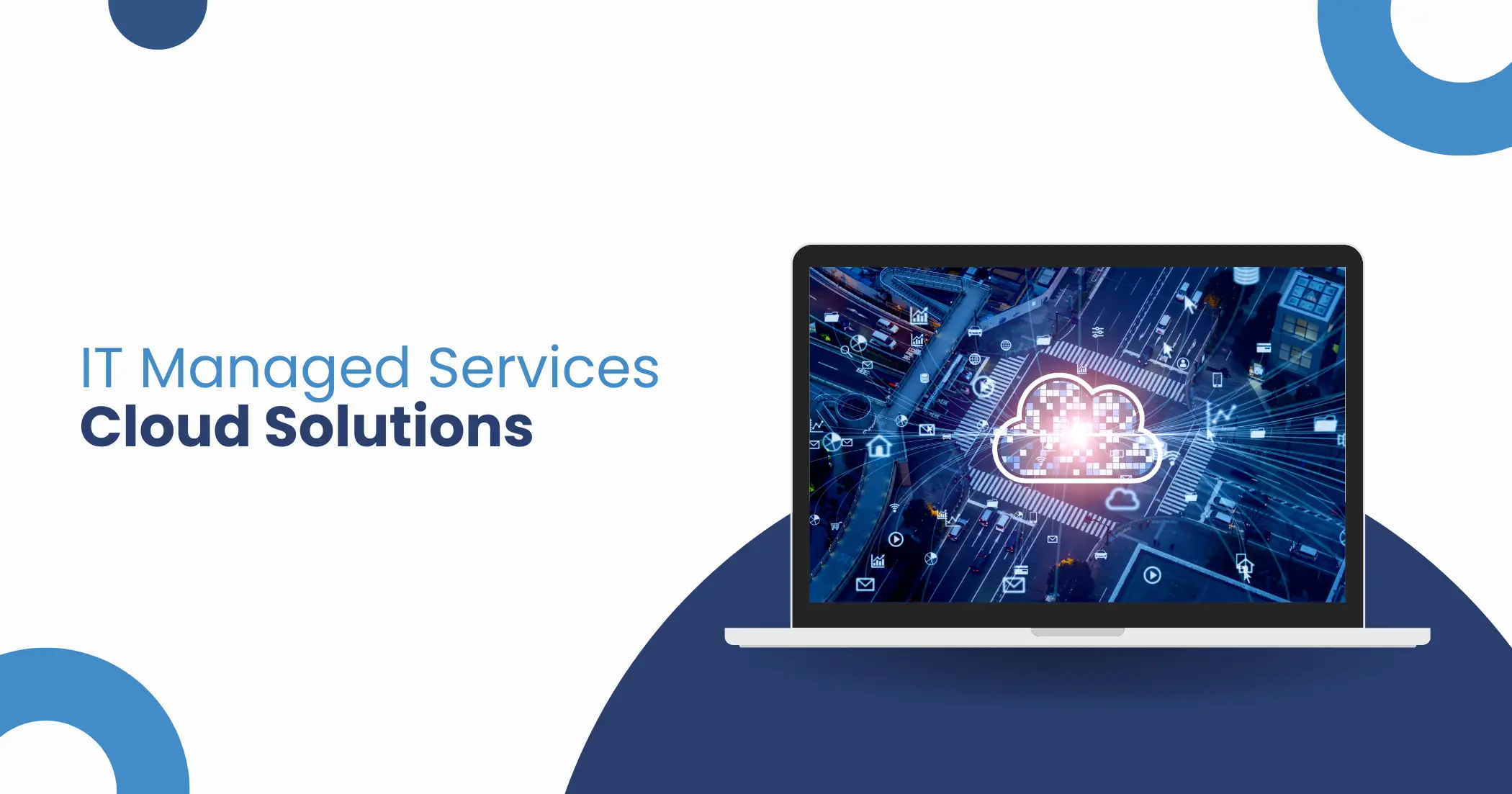In the modern era, cloud solutions have become integral to businesses looking for flexibility, scalability, and efficiency in their IT operations. These solutions encompass a wide range of services delivered over the internet, enabling organizations to store, manage, and process data effortlessly. As a key component of IT managed services, cloud solutions allow businesses to offload the complexities of IT infrastructure management, focusing instead on their core competencies.
Benefits of Cloud Solutions for Businesses
Adopting cloud solutions offers numerous advantages to businesses of all sizes. One of the primary benefits is cost savings. By leveraging cloud managed services, companies can significantly reduce capital expenditures associated with purchasing and maintaining physical hardware. Instead, they can pay for cloud services on a subscription basis, transforming large upfront costs into manageable operational expenses.
Another substantial benefit is scalability. Cloud solutions enable businesses to scale their IT resources up or down based on demand, ensuring they only pay for what they use. Companies whose workloads are unpredictable or who are going through a period of fast expansion will find this flexibility very useful. Additionally, cloud solutions enhance collaboration by providing employees with access to data and applications from anywhere, at any time, fostering a more productive and agile workforce capable of responding quickly to market changes.

Types of Cloud Services: IaaS, PaaS, and SaaS Explained
The three primary kinds of cloud services are software as a service, infrastructure as a service, and platform as a service. Understanding these categories is crucial for businesses looking to choose the right cloud solution for their needs.
When you sign up for Infrastructure as a Service (IaaS), you’ll have access to virtualized computer resources through the web. Organizations have the option to lease computing power, data storage space, and network hardware on an as-needed basis. This model offers maximum flexibility and control, allowing companies to build their IT environments without needing physical hardware.
Platform as a Service (PaaS) offers a development platform that includes operating systems, middleware, and other tools required to develop, test, and deploy applications. It abstracts the underlying infrastructure, enabling developers to focus on coding and application logic without worrying about hardware management.
The term software as a service (SaaS) refers to a model whereby paying customers have access to software programs through the web. These applications are hosted and maintained by the service provider, eliminating the need for businesses to install and manage software on their servers. SaaS is ideal for applications that require minimal customization and are used by a wide audience.
Public vs. Private vs. Hybrid Cloud: Which Is Right for You?
When considering cloud solutions, businesses must decide between public, private, and hybrid cloud environments, each offering distinct advantages.
Public cloud services are provided by third-party vendors over the internet and shared among multiple organizations. This model offers high scalability and cost-effectiveness, making it suitable for businesses with variable workloads and those looking to minimize IT costs.
Whether hosted in-house or by an outside vendor, private cloud solutions are devoted to the exclusive use of a particular enterprise. This model offers greater control, security, and customization, making it ideal for businesses with stringent regulatory requirements or those handling sensitive data.
Businesses may take use of the best features of both public and private clouds with a hybrid cloud. Critical workloads can be run in the private cloud for enhanced security, while less sensitive operations can be handled in the public cloud for cost efficiency and scalability.
Choosing the Right Cloud Service Provider
Selecting the right cloud service provider is a critical decision that can significantly impact a business’s operations. When evaluating providers, businesses should consider factors such as reliability, performance, security, and support. Key aspects to look for include robust service level agreements (SLAs) that guarantee uptime and performance, comprehensive security measures including encryption and access controls, and compliance with industry standards. Additionally, it is crucial to evaluate the level of customer support and the provider’s expertise in managing cloud solutions relevant to your industry. Lastly, comparing pricing models to find a solution that aligns with your budget and usage patterns is essential.
Cloud Migration Strategies and Best Practices
Migrating to the cloud is a process that needs meticulous preparation and execution to guarantee a seamless transfer with minimal disruption. The process begins with a thorough assessment of your current IT infrastructure and workloads to determine which applications and data are suitable for migration. Developing a detailed migration plan that outlines the steps, timeline, and resources required is also crucial. Prioritizing data security is essential during the migration process, ensuring that sensitive data is encrypted and access controls are in place. Starting with a pilot migration can help test the process and identify potential issues before a full-scale migration. Providing training for your IT staff and end-users ensures they are familiar with the new cloud environment and can utilize its features effectively. After migration, continuous monitoring of the performance and security of your cloud environment helps to address any issues promptly and optimize performance.
Cost Management in Cloud Solutions
Effective cost management is crucial for maximizing the benefits of cloud solutions. Businesses can achieve cost savings by regularly reviewing and adjusting the size of their cloud resources to match actual usage, avoiding over-provisioning. Taking advantage of reserved instances or long-term contracts offered by cloud providers for predictable workloads can provide significant discounts. Utilizing cost monitoring and management tools provided by cloud providers helps track usage and identify cost-saving opportunities. Implementing automation tools to start and stop resources based on usage patterns ensures you only pay for what you need.
Ensuring Data Security in the Cloud
Data security is a paramount concern when using cloud solutions. To ensure the security of your data in the cloud, it is important to encrypt data at rest and in transit to protect it from unauthorized access. Implementing robust access controls, including multi-factor authentication, helps restrict access to sensitive data. Ensuring that your cloud provider complies with relevant industry standards and regulations, such as GDPR, HIPAA, and ISO 27001, is also critical. Regular security audits and vulnerability assessments help identify and mitigate potential risks. Developing and maintaining an incident response plan ensures that you can quickly address and recover from security breaches.
Disaster Recovery and Business Continuity with Cloud Solutions
Cloud solutions offer robust disaster recovery (DR) and business continuity capabilities, ensuring that businesses can quickly recover from disruptions. Utilizing automated backup solutions to regularly backup data and applications to the cloud ensures minimal data loss in the event of a disaster. Storing backups in multiple geographic locations protects against regional disruptions. Leveraging cloud-based DR services allows for the quick restoration of critical applications and data, minimizing downtime. Regularly testing your disaster recovery plan ensures it works as expected and allows for necessary adjustments.
Scaling Your Business with Cloud Infrastructure
Cloud infrastructure enables businesses to scale their operations efficiently and cost-effectively. Cloud solutions provide elasticity, allowing businesses to quickly scale resources up or down based on demand, ensuring optimal performance during peak periods and cost savings during low usage periods. Cloud providers offer data centers in multiple regions, allowing businesses to expand their reach and deliver services to customers worldwide with low latency. Access to advanced cloud services and technologies, such as AI and machine learning, empowers businesses to innovate and stay competitive in their industry.
Optimizing Cloud Performance and Efficiency
To maximize the benefits of cloud solutions, businesses should focus on optimizing performance and efficiency. Using performance monitoring tools to track the health and performance of cloud resources helps identify and address issues proactively. Regularly reviewing and optimizing resource allocation ensures the efficient utilization of cloud infrastructure. Implementing load balancing to distribute traffic evenly across cloud resources ensures optimal performance and availability. Leveraging auto-scaling capabilities to automatically adjust resources based on real-time demand helps maintain performance while minimizing costs.
Compliance and Regulatory Considerations in Cloud Computing
Compliance with industry regulations and standards is critical when using cloud solutions. Ensuring that your data is stored and processed in compliance with local data sovereignty laws, which may require data to remain within specific geographic boundaries, is important. Verifying that your cloud provider adheres to industry standards and certifications, such as ISO 27001, SOC 2, and PCI DSS, helps ensure compliance. Maintaining detailed audit trails of data access and activity supports compliance reporting and investigations. Implementing policies and controls to enforce compliance with regulatory requirements and internal governance standards is also necessary.
Managed Services for Multi-Cloud Environments
Managing a multi-cloud environment can be complex, but managed services can help businesses navigate this landscape effectively. Managed service providers (MSPs) offer centralized management of multi-cloud environments, providing a single pane of glass for monitoring and managing resources across different cloud platforms. MSPs bring expertise in cloud management, helping businesses optimize their multi-cloud strategy and ensure seamless integration and operation. Managed services include robust security measures to protect data and applications across multiple cloud environments.
The Role of Artificial Intelligence in Cloud Solutions
Artificial intelligence (AI) is playing an increasingly significant role in cloud solutions. AI-driven tools and services enhance various aspects of cloud management, including resource optimization, security, and customer support. For instance, AI can analyze usage patterns to predict demand and automatically scale resources, ensuring efficient utilization. In terms of security, AI-powered systems can detect and respond to threats more quickly and accurately than traditional methods. Additionally, AI-driven chatbots and virtual assistants provide improved customer support, handling routine queries and freeing up human agents for more complex issues.
Future Trends in Cloud Computing and Managed IT Services
The future of cloud computing and managed IT services looks promising, with several trends set to shape the industry. One major trend is the continued growth of multi-cloud and hybrid cloud environments, as businesses seek to leverage the best features of different cloud providers. The integration of AI and machine learning into cloud services is expected to become even more prevalent, driving further innovation and efficiency. Additionally, edge computing is emerging as a significant trend, bringing computation and data storage closer to the sources of data to reduce latency and improve performance. Finally, as data privacy and security concerns continue to grow, stricter regulations and more robust security measures will become essential aspects of cloud computing.














